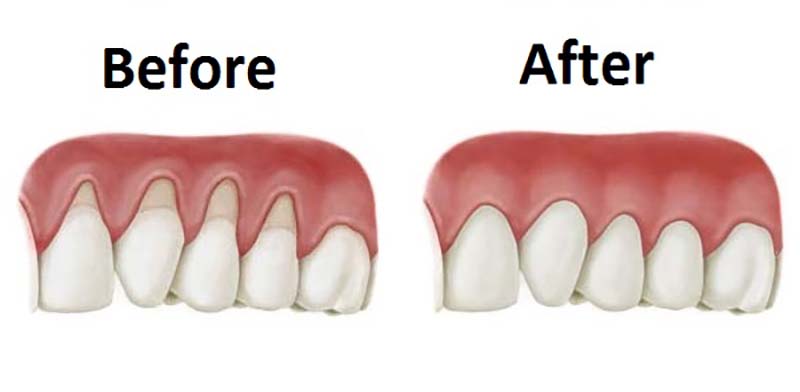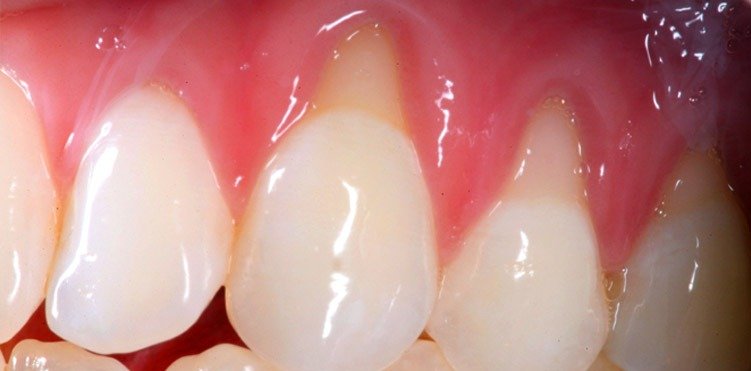 Receding gums occurs when the tooth are more visible than the usual length. The margin of the gum tissue that surrounds the teeth gradually wears away, or pulls back, exposing the tooth, or the tooth’s root. As a result, “pockets,” or gaps, form between the teeth and gum line. This makes it easy for disease-causing bacteria to build up. If ignored, the supporting tissue and bone structures of the teeth become sensitive and gradually gums recede and the receding gums lose teeth. Gum recession is a common dental problem and is treatable but it’s not something you want to ignore. If you think your gums are receding, make an appointment with your dentist. The treatment would prevent further damage.
Receding gums occurs when the tooth are more visible than the usual length. The margin of the gum tissue that surrounds the teeth gradually wears away, or pulls back, exposing the tooth, or the tooth’s root. As a result, “pockets,” or gaps, form between the teeth and gum line. This makes it easy for disease-causing bacteria to build up. If ignored, the supporting tissue and bone structures of the teeth become sensitive and gradually gums recede and the receding gums lose teeth. Gum recession is a common dental problem and is treatable but it’s not something you want to ignore. If you think your gums are receding, make an appointment with your dentist. The treatment would prevent further damage.
Reasons for Receding Gums
There are a number of factors that can cause receding gums:
Periodontal or Gum diseases. These are the main cause of gum recession. Periodontal diseases occur due to bacterial gum infections that destroy gum tissue and supporting bone which hold your teeth in place.
Hereditary. Some people are susceptible to periodontal diseases even if they take care their teeth very well. Reason could be their genes. Like the rest of the body, the characteristics of the gums are also hereditary. If gum recession runs in the family, then you are at higher risk as well.
Crooked teeth or a misaligned bite. When teeth do not come together evenly, too much force can be placed on the gums and bone, allowing gums to recede.
Aggressive tooth brushing. If you brush your teeth too hard or the wrong way, it can cause the enamel on your teeth to wear away and your gums to recede.
Poor dental care. If brushing, flossing, and rinsing with antibacterial mouthwash is inadequate then it makes it easy for plaque to turn into tartar (a hard substance that builds on and between your teeth). If untreated, it can lead to gum recession.
Hormonal changes. Fluctuations in female hormone levels during puberty, pregnancy, and menopause, can make gums more sensitive and more vulnerable to gum recession.
Use of Tobacco products. Tobacco users are more likely to have sticky plaque on their teeth that is difficult to remove and can cause gum recession.
Bruxism or Grinding and clenching your teeth. Habitual clenching or grinding your teeth mainly during sleep, put too much force on the teeth, causing gums to recede.
How to fix receding gums
Mild gum recession may be able to be treated by your dentist by deep cleaning the affected area. The exposed root area is smoothed to prevent the bacteria to attach itself. Medicines are also advised by the dentist to get rid of any remaining harmful bacteria.
In case the gum recession is not treatable through cleaning and medicines, then your dentist would refer to a periodontist for gums treatment.
Surgical Treatment of Gum Recession
Taking Care of your Gums to Avoid Gum Recession.
The best way to prevent gum recession is to take good care of your mouth.
- Brush and floss your teeth every day, in a proper way. Ask your dentist to show you the proper way.
- Visit your dentist or periodontist at least twice a year, or as recommended.
- Always use a soft-bristled toothbrush.
- If a misaligned bite or teeth grinding is the cause of gum recession, consult your dentist for treatment
- If you smoke or use tobacco products, immediately quit as it is very harmful not only for your mouth but overall health as well.
- Eat a well balanced and healthy diet.
- Never ignore or delay a consultation if you experience any changes in your mouth.
